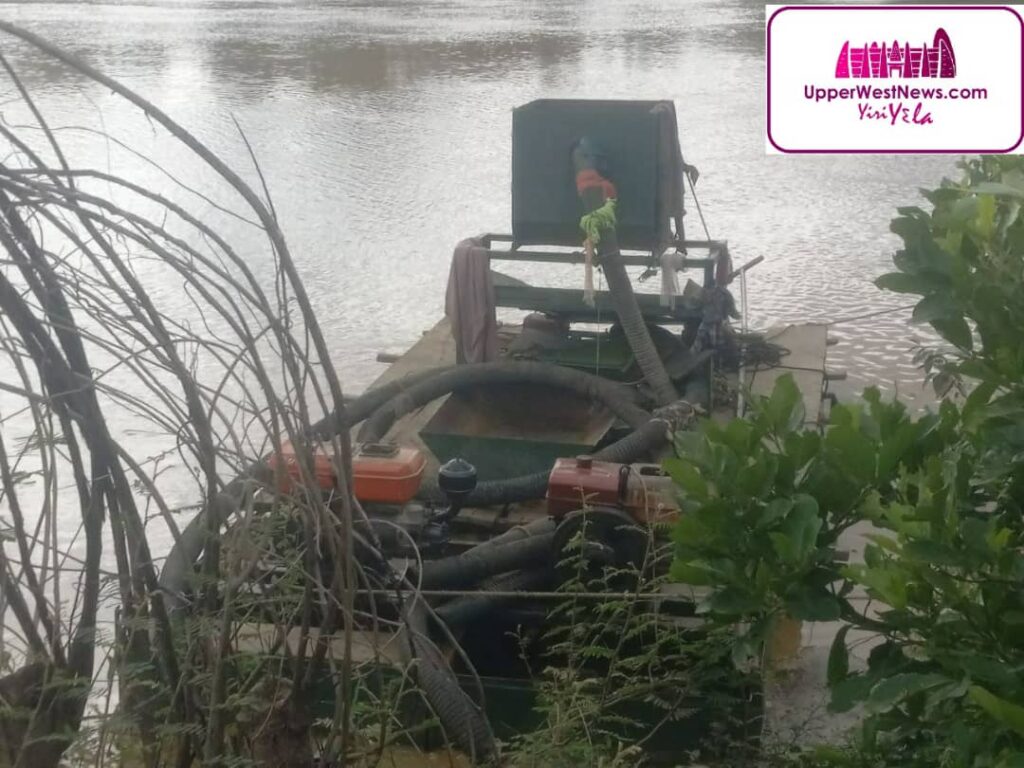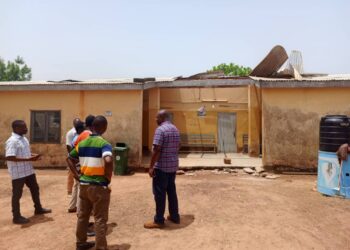Illegal mining, also known as galamsey, has been prevalent in the Upper West Region for several decades. Places like Manwe and Goripie in the Wa East District have become well-known for the surge in galamsey activities, attracting people from various locations.
With gold deposits spread across the region, Azumah Resources Ghana Limited, a mineral exploration and production company, has operated there for over a decade. The company has clashed with illegal miners, who feel that Azumah Resources has pushed them out of business.
The region suffers from the impact of illegal mining, with many farmlands being destroyed. This issue is particularly severe in areas like Manwe, Goripie, Danyorkuraa, Duu, Charikpong and Tapko.
Last year, the military intervened in Manwe, seizing the equipment of illegal miners to curb the practice.
The Wechiau Hippo Sanctuary, once a beacon of conservation and cultural heritage, faces a dire threat from illegal mining activities.

The serene sanctuary, nestled along the banks of the Black Volta River, has been invaded by galamseyers, as illegal miners are locally known.
This was revealed by the manager of the Wechiau Hippo Sanctuary, Abdullah Issahaku in an exclusive interview with upperwestnews. com on Saturday, 27th July, 2024 in Wechiau.
The galamseyers mounted changfan machines on the black volta river while undertaking their activities.
Their destructive activities have left visible scars on the landscape, disrupting the fragile ecosystem and endangering the unique biodiversity of the sanctuary.
‘In fact, it has been a new development since two, three years ago. We’ve started experiencing the movement of galamsey operation in the core zone,’ Abdullah Issahaku revealed.
The Wechiau Hippo Sanctuary, established in 1998, is a community-based initiative born from the collaborative efforts of local chiefs, landlords, queen mothers, and the people of 20 communities in the Wa West District.
“It has been sad. The Wechiau Hippo Sanctuary is the only tourist site in the whole of the Upper West Region, let me say. The only tourism site you can boast of,” Issahaku emphasized.
The sanctuary is home to over 50 hippos, 250 bird species, various plant species, and countless other living creatures.
It is not just an ecological treasure but also a crucial economic and cultural hub for the region. However, the illegal activities of galamseyers now threaten to unravel the delicate balance of the sanctuary.
Abdullah Isahaku expressed his deep concern over the presence of illegal mining machinery saying “Today we are here to look at how far the galamsey operators are moving into the protected zone of the Wechiau Community Hippo Sanctuary. In fact, we’ve seen some changfan machines which these people use to do the galamsey on the Black Volta River.”
The riverbanks, once lush and vibrant, are now marred by the telltale signs of illegal mining: deforestation, soil erosion, and polluted waters.
The manager warned of the broader implications of continued galamsey activities in in sanctuary. “If this thing is allowed to happen on the Black Volta River, it is not only going to spoil or soil the good work of the people of the Wechiau area. It is also going to contaminate the water which many people use for household chores and animals also drink it.”
The galamsey activities in the sanctuary are not just a threat to the environment but also to the social and economic fabric of the Wechiau community.
The collapse of the sanctuary would have far-reaching consequences, affecting the livelihoods of thousands and dismantling years of hard-won progress.
“I’m appealing to the chiefs, I’m appealing to the district chief executive, I’m appealing to the forces, the agencies, the security services to team up and come to the aid of the management of the Wechiau Community Hippo Sanctuary,’ the manager of the sanctuary reiterated.
The dependence on the sanctuary by the community cannot be overstated. The various initiatives by the sanctuary have provided economic opportunities and improved the quality of life for many residents.
The employment opportunities generated by the sanctuary have been a lifeline for over 3,000 people. The support for organic shea and groundnut production by the sanctuary has empowered over 2,000 women, providing them with a sustainable source of income.
The scholarships and educational materials provided by the sanctuary have helped many students pursue their education, creating a brighter future for the youth in the community.
However, the current crisis threatens to undo all of this progress and Abdullah Issahaku has urged authorities to help curb galamsey activities in the sanctuary.
Galamsey activities have caused widespread environmental degradation across the country, threatening water bodies, forests, and wildlife. The invasion of the Wechiau Community Hippo Sanctuary is a tragic example of the far-reaching consequences of these activities.



















